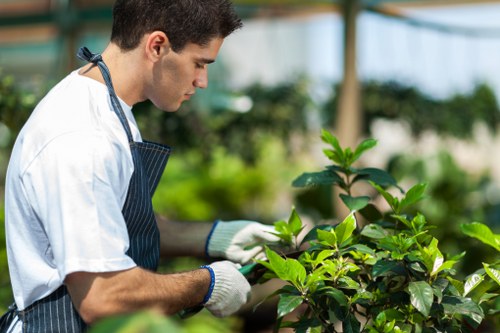Garden Maintenance in Acton

Garden maintenance in Acton is essential for keeping your outdoor space beautiful, healthy, and thriving throughout the year. Whether you're a seasoned gardener or a beginner, regular upkeep ensures that your garden remains a sanctuary of peace and natural beauty. In this comprehensive guide, we'll explore various aspects of garden maintenance, offering practical tips and insights tailored to the unique climate and conditions in Acton.
Maintaining a garden involves a combination of routine tasks and seasonal care. From pruning and weeding to soil enrichment and pest control, each activity plays a pivotal role in the overall health of your plants. Understanding the specific needs of your garden can help you create a thriving environment that enhances the aesthetic appeal of your property.
One of the primary benefits of professional garden maintenance services in Acton is the expertise they bring. Local gardeners are familiar with the region's soil types, weather patterns, and native plant species, allowing them to provide customized care that promotes optimal growth. Additionally, professional services can save you time and effort, enabling you to enjoy a beautiful garden without the stress of constant upkeep.

Essential Garden Maintenance Tasks
Keeping your garden in top shape requires attention to several key maintenance tasks. These include:
- Weeding: Regular removal of weeds prevents them from competing with your plants for nutrients and water.
- Pruning: Trimming dead or overgrown branches helps maintain the shape and health of your plants.
- Watering: Adequate watering ensures that plants receive the moisture they need to thrive, especially during dry spells.
- Fertilizing: Adding fertilizer provides essential nutrients that promote vigorous growth and flowering.
- Pest Control: Identifying and managing pests early can prevent significant damage to your garden.
By staying on top of these tasks, you can ensure that your garden remains lush and vibrant throughout the year.
In addition to these routine tasks, seasonal maintenance is crucial. Each season presents unique challenges and opportunities for garden care. For instance, spring is ideal for planting new flowers and vegetables, while autumn is the time for preparing your garden for the winter months. Understanding the seasonal cycles in Acton can help you plan your maintenance activities effectively.

Choosing the Right Plants for Acton Gardens
Selecting plants that are well-suited to the Acton climate is fundamental to successful garden maintenance. Native plants are often the best choice, as they are adapted to the local soil and weather conditions. They typically require less water and are more resistant to pests, making them easier to maintain.
Some popular native plants for Acton gardens include lavender, which thrives in sunny locations and well-drained soil; hostas, known for their attractive foliage and shade tolerance; and roses, which add color and fragrance to any garden setting.
When choosing plants, consider factors such as sunlight exposure, soil type, and water availability. Grouping plants with similar needs together can simplify your maintenance routine and promote a healthier garden.

Soil Health and Fertilization
Healthy soil is the foundation of a thriving garden. Regularly testing your soil's pH and nutrient levels can help you understand its composition and identify any deficiencies. Based on the results, you can amend the soil with appropriate fertilizers or organic matter to enhance its fertility.
Composting is an excellent way to improve soil health naturally. Compost adds essential nutrients, improves soil structure, and increases its ability to retain moisture. By incorporating compost into your garden beds, you can create a more resilient and productive growing environment.
Additionally, mulching helps retain soil moisture, suppress weeds, and regulate soil temperature. Organic mulches, such as bark or straw, also break down over time, contributing to the overall fertility of your soil.

Pest and Disease Management
Effective pest and disease management is critical for maintaining a healthy garden. Regular monitoring allows you to detect issues early and take appropriate action before they become severe. Integrated Pest Management (IPM) is a sustainable approach that combines biological, cultural, and chemical methods to control pests with minimal environmental impact.
- Biological Controls: Introducing natural predators, such as ladybugs or predatory nematodes, can help reduce pest populations.
- Cultural Practices: Crop rotation, proper spacing, and sanitation can minimize the conditions that favor pests and diseases.
- Chemical Controls: When necessary, using targeted and environmentally friendly pesticides can effectively manage pest outbreaks.
By adopting a proactive approach to pest and disease management, you can protect your plants and ensure the longevity of your garden.
Regularly inspecting your plants for signs of distress, such as discolored leaves or unusual growth patterns, can help you identify problems early. Addressing issues promptly prevents them from spreading and causing more significant damage.

Seasonal Garden Maintenance Tips
Spring Maintenance
Spring is a time of renewal and growth in the garden. Begin by clearing away any debris from the winter months, such as fallen leaves and dead branches. This cleanup creates space for new growth and reduces the risk of pest infestations.
- Planting: Early spring is ideal for planting perennials, annuals, and vegetables. Ensure that you choose plants suitable for Acton's climate.
- Soil Preparation: Amend the soil with compost or other organic matter to improve fertility and structure.
- Pruning: Prune dormant trees and shrubs to promote healthy growth and flowering.
Summer Maintenance
Summer brings the challenge of maintaining moisture levels and managing the heat. Regular watering is essential, particularly during dry spells. Drip irrigation systems can provide consistent moisture without overwatering.
- Mulching: Apply mulch to retain soil moisture and keep roots cool.
- Pest Control: Monitor for pests and apply appropriate treatments as needed.
- Deadheading: Remove spent flowers to encourage continuous blooming.
Autumn Maintenance
Autumn is a time to prepare your garden for the colder months. Start by removing dead or diseased plant material to prevent overwintering pests and diseases.
- Planting Bulbs: Plant spring-flowering bulbs before the first frost.
- Soil Care: Add compost or manure to enrich the soil for the next growing season.
- Leaf Management: Use fallen leaves as mulch or compost them to recycle nutrients back into the garden.
Winter Maintenance
During winter, focus on protecting your garden from harsh weather conditions. Cover sensitive plants with mulch or burlap to shield them from frost and wind.
- Tool Maintenance: Clean and store garden tools to keep them in good condition for the spring.
- Planning: Use the quieter months to plan your garden layout and select new plants for the upcoming season.

Benefits of Professional Garden Maintenance Services
While some gardeners prefer a hands-on approach, hiring professional garden maintenance services in Acton offers numerous advantages. Professionals bring expertise and experience that can enhance the health and appearance of your garden.
- Time-Saving: Professionals handle all aspects of garden maintenance, freeing up your time for other activities.
- Expert Knowledge: Experienced gardeners understand the best practices for plant care, soil management, and pest control specific to Acton.
- Customized Services: Professionals can tailor their services to meet the unique needs of your garden, ensuring optimal results.
- Stress Reduction: Delegating garden maintenance tasks to experts can reduce the stress and physical effort involved in keeping your garden pristine.
Investing in professional maintenance not only preserves the beauty of your garden but also increases the value of your property.
If you're looking to take your garden to the next level, consider partnering with a local garden maintenance service in Acton. Their expertise can make a significant difference in the overall health and aesthetics of your outdoor space.

Eco-Friendly Garden Maintenance Practices
Adopting eco-friendly practices in your garden maintenance routine can benefit both the environment and your garden's health. Sustainable gardening minimizes the use of harmful chemicals, conserves water, and promotes biodiversity.
Organic Gardening
Organic gardening avoids synthetic pesticides and fertilizers, instead relying on natural alternatives to nourish plants and control pests. Techniques include using compost, natural mulches, and biological pest control methods.
Water Conservation
Implementing water-saving strategies is crucial, especially during dry periods. Methods such as rainwater harvesting, drip irrigation, and mulching help reduce water waste and ensure that plants receive adequate moisture.
Biodiversity
Encouraging biodiversity in your garden supports a healthy ecosystem. Planting a variety of species attracts beneficial insects, birds, and other wildlife that contribute to pest control and pollination.
- Companion Planting: Growing complementary plants together can enhance growth and deter pests.
- Native Plants: Incorporating native species supports local wildlife and reduces the need for additional water and fertilizers.
By embracing eco-friendly maintenance practices, you can create a sustainable and resilient garden that benefits both you and the environment.

Tools and Equipment for Effective Garden Maintenance
Having the right tools and equipment is essential for efficient garden maintenance. Investing in quality tools can make tasks easier and more enjoyable, while also ensuring better results.
- Pruning Shears: Essential for trimming and shaping plants.
- Garden Fork: Useful for turning soil and incorporating compost.
- Hose and Sprinklers: Necessary for adequate watering of plants.
- Wheelbarrow: Facilitates the transportation of soil, plants, and tools.
- Mulching Tools: Help in applying and spreading mulch evenly.
Regular maintenance of your tools, such as cleaning and sharpening, extends their lifespan and ensures safe and effective use. Proper storage also prevents rust and damage, keeping your tools ready for the next gardening season.
For larger gardens, consider investing in power tools like lawn mowers, leaf blowers, and hedge trimmers to save time and effort. However, always prioritize safety by following manufacturer instructions and using protective gear when operating machinery.

Creating a Maintenance Schedule
Developing a garden maintenance schedule helps you stay organized and ensures that all necessary tasks are completed in a timely manner. A well-structured plan covers daily, weekly, monthly, and seasonal activities, promoting consistent care and preventing neglect.
Daily Tasks
- Check moisture levels and water plants as needed.
- Remove any immediate weeds or debris.
- Inspect plants for signs of pests or disease.
Weekly Tasks
- Weed garden beds and paths.
- Prune overgrown branches and stems.
- Apply mulch to retain soil moisture.
Monthly Tasks
- Fertilize plants according to their specific needs.
- Rotate crops in vegetable gardens to promote soil health.
- Clean and maintain garden tools.
Seasonal Tasks
- Spring: Plant new species, prepare soil, and prune dormant trees.
- Summer: Manage watering schedules, deadhead flowers, and protect plants from heat stress.
- Autumn: Clear fallen leaves, plant bulbs, and prepare plants for winter.
- Winter: Protect sensitive plants, plan for the next season, and perform tool maintenance.
A maintenance schedule not only keeps your garden in excellent condition but also helps you manage your time and resources effectively. Customize the schedule based on your garden's specific requirements and your personal availability.

DIY vs. Professional Garden Maintenance
Deciding between DIY garden maintenance and hiring professionals depends on various factors, including your budget, time, and expertise. Understanding the pros and cons of each approach can help you make an informed decision.
DIY Garden Maintenance
- Pros: Cost-effective, offers personal satisfaction, and allows for complete control over the garden.
- Cons: Time-consuming, requires knowledge and skills, and may lead to inconsistent results.
Professional Garden Maintenance
- Pros: Expertise and experience, time-saving, consistent and high-quality results, and access to specialized equipment.
- Cons: Higher cost compared to DIY, less personal involvement in the maintenance process.
Many homeowners find a hybrid approach most effective, handling some tasks themselves while outsourcing more complex or time-consuming activities to professionals.
Ultimately, whether you choose to maintain your garden yourself or hire a professional service, the key is to ensure regular care and attention to keep your garden healthy and beautiful.

Common Challenges in Garden Maintenance
Gardening comes with its own set of challenges, especially in a climate like Acton's. Being aware of these challenges helps you prepare and implement strategies to overcome them effectively.
Weather Extremes
Acton experiences a range of weather conditions, from hot summers to cold winters. Extreme weather can stress plants, leading to reduced growth or even plant death. Implementing protective measures, such as mulching, using shade cloths, and proper watering techniques, can help mitigate these effects.
Pests and Diseases
Managing pests and diseases is a constant battle for gardeners. Regular monitoring, employing integrated pest management strategies, and choosing resistant plant varieties can reduce the impact of infestations and infections.
Soil Quality
Poor soil quality can hinder plant growth and health. Regular soil testing, adding organic matter, and using appropriate fertilizers can improve soil structure and fertility.
Time Constraints
Maintaining a garden requires dedication and time. Busy schedules can make it challenging to keep up with necessary tasks. Creating a realistic maintenance schedule and seeking professional help when needed can alleviate this issue.

Enhancing Your Garden's Aesthetic Appeal
Aesthetic appeal is a significant aspect of garden maintenance. A well-maintained garden not only provides a pleasant environment but also adds to the overall value of your property. Here are some tips to enhance the beauty of your garden:
Plant Arrangement
Strategically arranging plants based on their size, color, and blooming seasons creates visual interest and harmony. Consider using focal points, such as a striking tree or a colorful flower bed, to draw the eye.
Use of Hardscaping
Incorporating elements like pathways, patios, and garden structures adds structure and functionality to your garden. These features can also enhance the overall aesthetic by providing contrast and variety.
Lighting
Garden lighting extends the usability of your outdoor space into the evening and highlights key features. Solar-powered lights are an eco-friendly option that requires minimal maintenance.
Water Features
Adding water features like fountains or ponds introduces the soothing sound of water and attracts wildlife, enhancing the tranquility of your garden.
Seasonal Decorations
Incorporating seasonal decorations, such as autumn leaves or winter ornaments, can keep your garden looking fresh and inviting throughout the year.

Sustainable Garden Maintenance Practices
Embracing sustainability in your garden maintenance not only benefits the environment but also promotes a healthier and more resilient garden. Here are some sustainable practices to consider:
Composting
Composting organic waste reduces landfill usage and provides a rich source of nutrients for your garden. By recycling kitchen scraps and garden waste, you can create a natural fertilizer that enhances soil health.
Rainwater Harvesting
Collecting rainwater for garden use conserves water and reduces your reliance on municipal sources. Rain barrels can be installed to capture and store water during rainy periods.
Native Plant Utilization
Using native plants minimizes water and fertilizer needs, as these plants are adapted to the local environment. They also support local wildlife and contribute to biodiversity.
Organic Pest Control
Avoiding chemical pesticides protects beneficial insects and maintains the ecological balance in your garden. Natural alternatives, such as neem oil or insecticidal soaps, are effective and eco-friendly.
Energy-Efficient Tools
Opting for battery-powered or manual gardening tools reduces energy consumption and lowers your carbon footprint.
By integrating these sustainable practices, you can create an environmentally friendly garden that thrives with minimal impact on the planet.

Leveraging Technology in Garden Maintenance
Modern technology offers numerous tools and solutions to simplify garden maintenance and enhance its effectiveness. Integrating technology into your gardening routine can save time, improve efficiency, and promote better plant health.
Smart Irrigation Systems
Smart irrigation systems use sensors and weather data to optimize watering schedules, ensuring that plants receive the right amount of water without wastage. These systems can be controlled via smartphones, providing convenience and precision.
Garden Management Apps
Various apps are available to help you plan, track, and manage your garden. Features may include plant identification, maintenance reminders, and growth tracking, making it easier to stay organized.
Automated Tools
Automated tools, such as robotic lawn mowers and weeders, can handle routine tasks with minimal intervention. These devices save time and effort, allowing you to focus on other aspects of garden care.
Drones for Garden Monitoring
Drones equipped with cameras and sensors can monitor large gardens, providing detailed insights into plant health, soil conditions, and pest activity. This technology enables proactive maintenance and targeted interventions.
LED Grow Lights
LED grow lights support plant growth in areas with limited natural light. These energy-efficient lights can be adjusted to provide the optimal spectrum for photosynthesis, enhancing plant development.
Embracing technological advancements can significantly improve your garden maintenance practices, leading to a more productive and aesthetically pleasing garden.
Contact us today to learn how our professional garden maintenance services in Acton can incorporate the latest technologies to keep your garden thriving.
